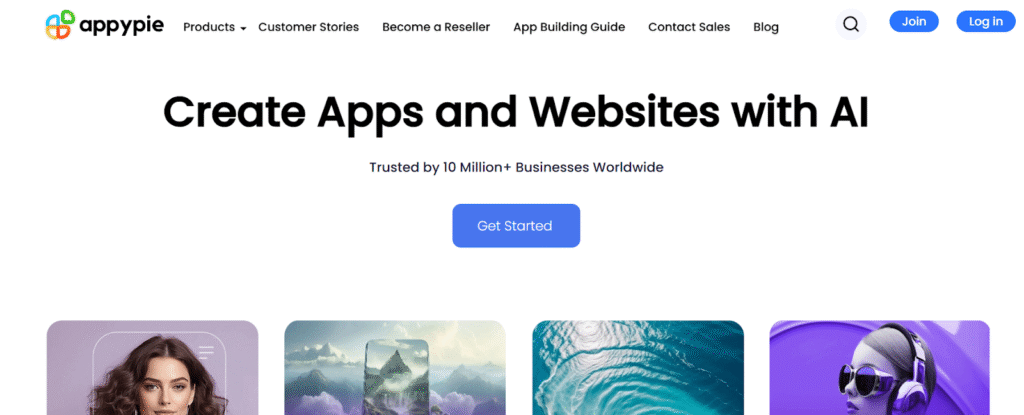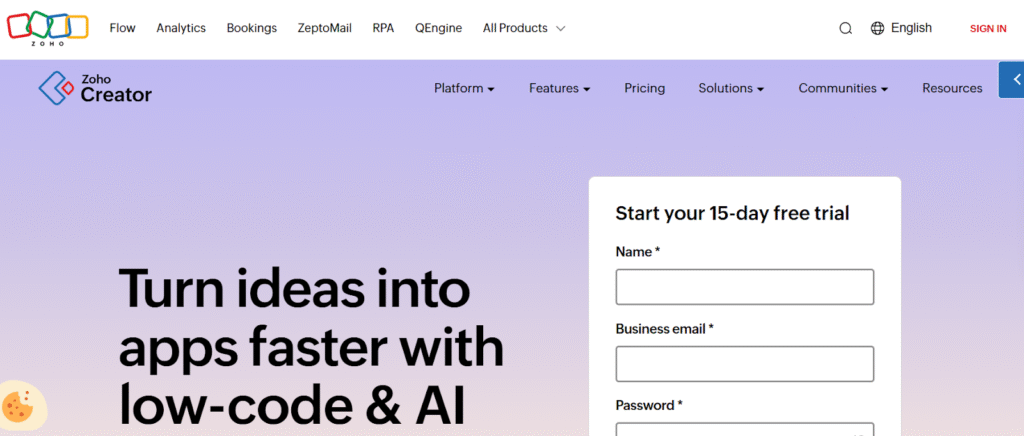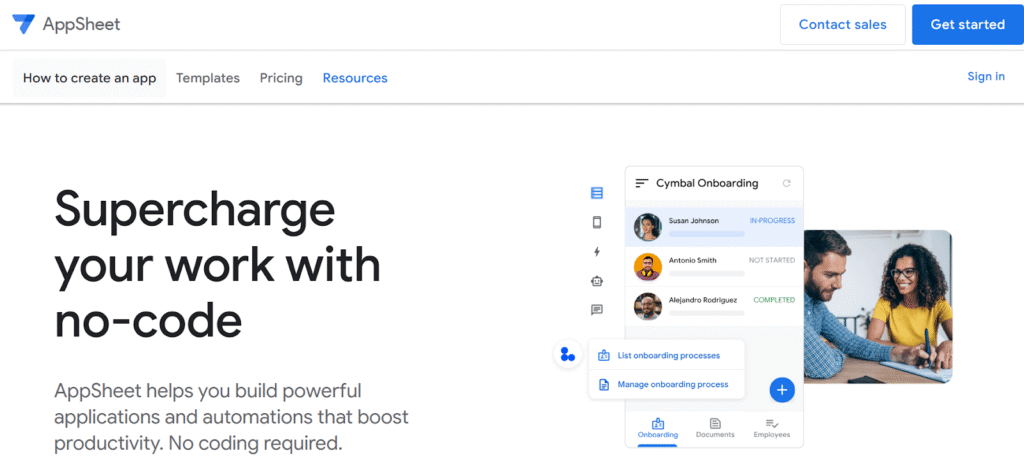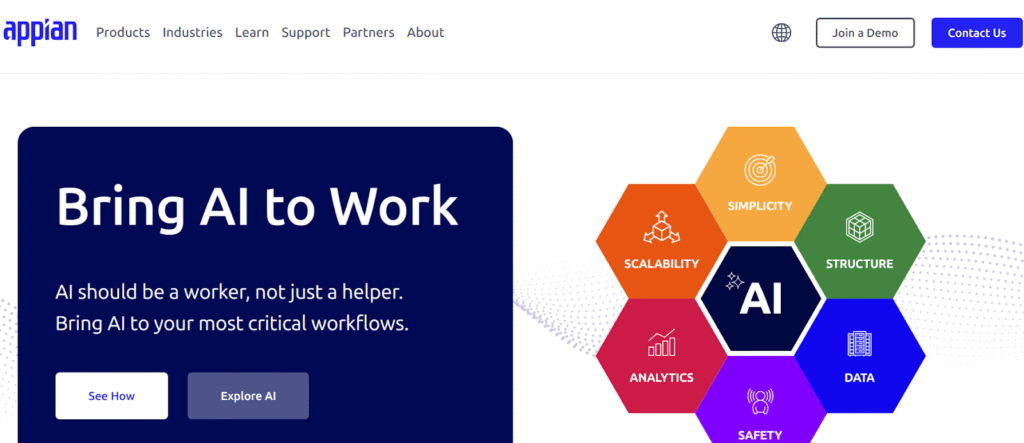You’re in the perfect place if you want to create mobile apps for your company without deep expertise in programming. Whether you’re a corporate team, developer, or entrepreneur, we’ll examine the best platform for mobile application development in this guide for you.
These platforms for developing mobile apps assist you in creating, testing, and releasing apps for iOS and Android. Many of them also provide cross-platform development for mobile devices, allowing you to create once and publish anywhere. So if you wonder, “Which platform is best for mobile application development?”, this material is for you. Let’s start.
What Are the Best Platforms for Mobile App Development?
That depends on your goals, whether it’s speed, flexibility, scalability, or enterprise-grade automation. But one thing is clear: the market is full of platforms that make developing mobile apps more accessible than ever. Here’s our breakdown of the best platform for mobile application development in 2025.
Appy Pie

Appy Pie, as a platform for developing mobile apps, offers comprehensive features, becoming an intuitive, drag-and-drop platform for developing mobile apps. It supports chatbots, AI, AR/VR, and more, which makes it ideal for small businesses or individuals who need an easy, no-code route to app deployment.
Why it’s the best platform for mobile application development:
- No coding skills needed,
- Built-in tools for AI, chatbot, and AR/VR features,
- Publish directly to Google Play and the App Store.
With the help of a straightforward drag-and-drop interface, you can incorporate technologies like chatbots, artificial intelligence, and virtual or augmented reality. A learning portal and a collection of training videos are offered to aid with cross platform development for mobile.
You may develop an app for practically any type of company need, including radio apps, restaurants, real estate, and small businesses. You can choose to release your app on the Google Play and Apple App stores after it has been developed.
Zoho Creator

A best platform for developing mobile apps of our choice due to its versatility is Zoho Creator. It stands out among mobile application development platforms. You can link to data tools like QuickBooks or PayPal, create your own apps or use pre-made ones, and distribute them across several devices. As a result, Zoho Creator is great for businesses looking for cross-platform mobile development. The main features include:
- Drag-and-drop builder,
- Broad third-party integrations,
- Custom automation for business processes.
Although Zoho Creator was first designed for companies that wanted to create apps for certain internal needs, it may also be used to create apps for a broader audience.
Better yet, it can be made more usable by integrating data from other apps. Other Zoho apps, QuickBooks, Twilio, Google Workspace, and PayPal are possible connections.
When invoiced annually, the starting price is $20 per user per month, which includes 20 integration flows, 10 BI & analytics workspaces, and 5 apps. One person and one app are the only ones who can utilize the free version.
AppSheet

One of the best platforms for mobile app development using spreadsheet data is AppSheet. Supported by Google, it’s among the greatest resources for creating cross-platform mobile apps, particularly if you’re already familiar with Microsoft Excel or Google Workspace.
The top features for mobile-first business apps:
- Seamless data integration,
- Powerful customization,
- Works across Android and iOS.
Features like GPS and maps, picture and code scanning, signature capture, charts, and email alerts can be added on top of these.
Up to ten individuals can participate in the process, and there is no time limit or fee for creating your app. Pricing is determined by the number of active users each month after deployment.
AppSheet offers a range of price points, with their Starter plan costing about $5 per user per month. Spreadsheets and cloud file storage providers are connected, along with basic automation and application functionalities among best tool for cross platform mobile app development.
Appery.io

Appery.io is a best cross platform for mobile development with rapid turnaround. It’s a perfect for people who need to create a lot of apps fast. It facilitates cross-platform mobile development with JavaScript, HTML5, and APIs. Teams can create and release apps in a matter of days thanks to the platform’s visual editor.
The best framework for developing cross-platform mobile applications quickly:
- Visual App Builder,
- Cloud-based backend,
- Reusable templates for various applications.
Appery.io enables a focus on extensibility in addition to faster turnaround times, allowing for easy modification of the same apps without requiring a large amount of development time.
To lessen the need for replication in developing apps, Appery.io, which is built on an open platform, enables many apps to be generated from the same basis according to demand. It also enables the flexible development of apps by company objectives by guaranteeing that configurations can be altered rather than relying on pre-existing settings of the best platform for cross platform mobile development.
The Beginners package for one developer, which costs about $25 per month and includes two apps and 50K Platform API calls, is the first of four options available on Appery.io.
Appian

A best framework for cross platform mobile development in large-scale environments is Appian. Appian specializes in low-code enterprise apps that enable AI integration and workflow automation. If you’re managing teams from different departments and complex data, this is one of the greatest platforms for developing mobile apps.
Why it’s the greatest platform for developing business mobile apps:
- A visual editor for intricate logic,
- Quick time to market (less than eight weeks),
- Native output for iOS and Android apps.
Additionally, information can be harmonized to offer genuine potential for insights on anything from operations to workflows to management processes by coordinating data from many sources.
During the actual development process, a visual editor is used to choose the appropriate functions and the data routing via them. The goal is to make it possible to set up complicated options in an easy-to-understand manner so that data may be managed effectively.
If necessary, the finished design can be saved as a native iOS and Android app or as a web application. On-the-fly modifications can be made without resulting in downtime.
Bonus
Although the aforementioned development platforms for mobile applications are excellent for business, Unity or Unreal Engine are the greatest platforms for developing mobile games. These platforms have the greatest programming languages for cross-platform mobile development in gaming settings, as well as the best graphics and physics engines.
Concussion
Your use case will determine which cross platform development for mobile devices tool is appropriate for developing mobile apps. The speed, versatility, and usability of today’s platforms are unparalleled, whether they are used for internal tools, consumer engagement, or mobile games.
Regardless of your level of technical expertise, these tools—which range from drag-and-drop editors to enterprise-grade solutions—make app development easier than ever.
FAQs
What is the best platform for mobile app development?
Appy Pie is a good choice if you’re just getting started or need an internal tool quickly. Appian and Zoho Creator provide greater scalability and capacity for complicated apps or enterprise use. In terms of versatility and reusability, Appery.io and Zoho Creator are at the top, particularly when delivering to both iOS and Android at the same time.
What is the best programming language for cross platform mobile development?
These days, the most popular options are JavaScript, Dart (via Flutter), and C# (through Xamarin or Unity).
Which is the best platform for mobile game development?
Unity is the top platform for creating mobile games in 2025. Unity’s cross-platform features, extensive asset store, and compatibility with both 2D and 3D games make it a popular choice. Despite being user-friendly for beginners, it has enough power for AAA games. Deploying to iOS, Android, and even consoles only requires a single build.